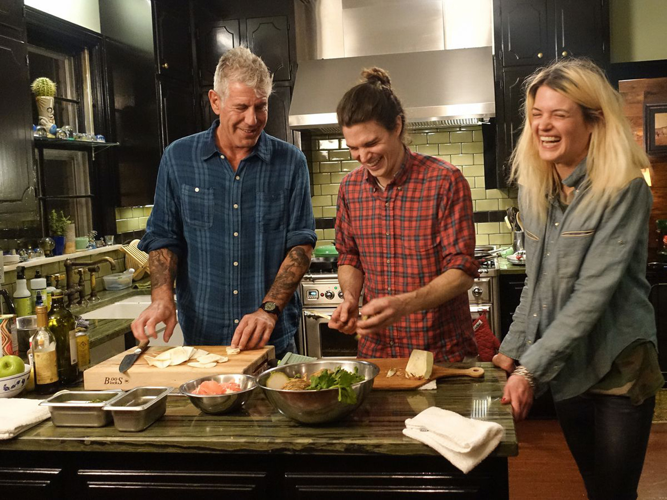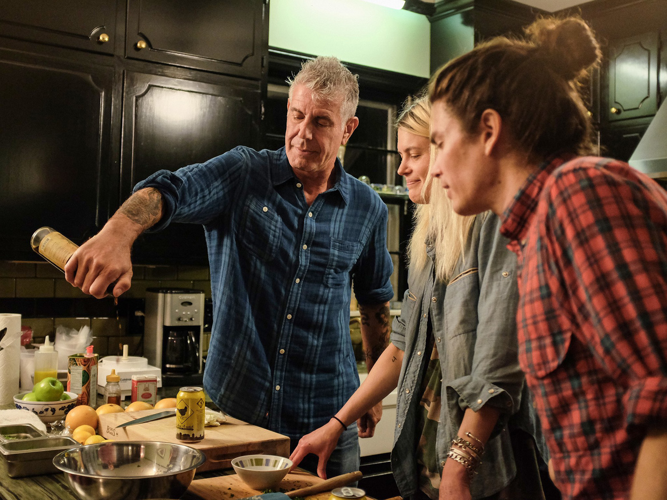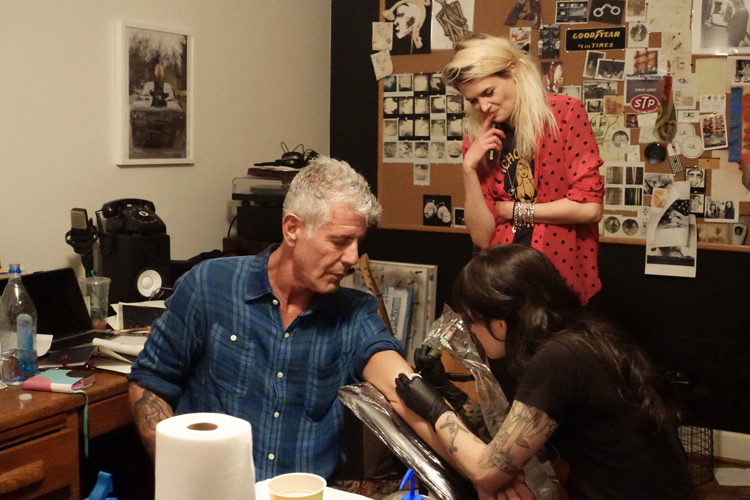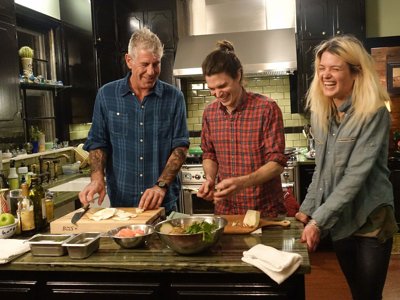
Anthony Bourdain cooking with Alison and Matthew Mosshart while filming the Nashville episode of Parts Unknown
My first boss in the restaurant business, Brian, was a gourmand trapped in a grimy joint. He made real aioli. He knew the Bordeaux Grands Crus. One shift, he disappeared to the store, then returned and ducked into the kitchen. He eventually emerged with a deftly composed salade Niçoise, a refined oddity in a place where most dishes hit the table with a cook’s mayonnaise thumbprint still on the plate.
My conversations with Brian fertilized my blooming interest in food. During the dead parts of day shifts, we’d lean on the bar and quiz each other on The Food Lover’s Companion. One day in 2004, he presented me with his copy of a New York chef’s irreverent memoir, which I devoured on my next day off. It was immensely entertaining, and it sent me on a years-long quest through the culinary canon, from the newly famous Michael Pollan back to Brillat-Savarin. That book was Kitchen Confidential by Anthony Bourdain.
If I was already a creature of the world Bourdain described, it hadn’t dawned on me yet. I didn’t feel like one of the lifers Bourdain seemed to glorify in his book. I believed I was in it for the flexibility that allowed me to pursue songwriting, the same false calling that brought me to Nashville. In reality, I was bartending because it was perfect for a young guy who was prioritizing drinking and getting laid over any long-term plans, whether he saw it that way or not.
The cooks at my job were not the mercenaries and vagabonds of Bourdain’s world, but Mexican family men whose cousins, uncles and brothers filled most of the positions in the bar. Still, Kitchen Confidential resonated deeply. There were the front-of-house trysts; the secrets about what the outside world credulously calls “food safety”; the “buyback,” an unfamiliar term for the very familiar practice of serving favored patrons gallons of alcohol and cutting the cash register out of the transaction. Finally, there was the grim toleration of customers whom we valued for their financial support but disdained for just about everything else: for making special requests, for coming in right before we closed, for coming in right after we opened, for staying too long, for being rude or too nice, for being vegetarians, for having silly aversions or legitimate allergies, or for being anything other than whatever our idea of the perfect customer was that day. This author — this cook — knew everything I knew, a ton that I didn’t, and delivered it all in a profanity-seasoned voice that moved frictionlessly from the page to my brain. Reading him was like hearing a great story in a bar.
A few years later, I entered the world of fine dining. Over the next decade, as I became steeped in it, the restaurant life started looking less like a way station on the road to artistic riches and more like what I was actually doing with my life. As that reality set in, Bourdain and his rising profile interested me less and less. There was no longer anything about the business that I needed exposed or decoded. Salty cooks’ unfiltered opinions? I got plenty at work.
Bourdain’s influence rippled throughout the food world. The web was rife with polemics about pork belly. Cooks were more tattooed than ever. Diners snapped pic after pic of their dinner as it ceased to steam and took pedantic joy in naming famous farmers and obscure beans. When social media went absolutely bats during Bourdain’s 2016 Nashville visit, I turned to Annika Best-Wittenberg, my co-worker at Josephine, and I griped, “Who is still that into Anthony Bourdain?”
I had complained to the perfect person. Annika adored Bourdain, and hearing her perspective schooled me on what I had been ignoring: Bourdain’s transformation from bawdy yet eloquent cook to picaresque adventurer and teller of truths. Annika is a photographer, and she found the famous Beirut episode of Bourdain’s food-and-travel show No Reservations so compelling that she spent two months in Lebanon in 2014-15, first volunteering with Syrian refugees in Zahlé, then shooting in the capital city where Bourdain and his crew had been marooned. She exhibited her photos of Syrian refugees at Red Arrow Gallery in East Nashville when she returned. Nashville Public Radio did a story on the show.
Watching Bourdain interacting openly with foreign people and places did nothing less than shape how Annika wanted to experience the world. “I didn’t want to be a Westerner saying, ‘Where’s the ketchup?’” she tells me. She sees Bourdain’s ethos in an Armenian maxim that she heard in Beirut: If you break bread and share salt with someone, you will never forget them. “I think that’s the heart of what he shared,” she says.
Matthew Mosshart is another Nashvillian who has long felt Bourdain’s influence. He’s the chef with the long mane of brown hair and mile-wide smile who, along with his sister Alison (of The Kills and The Dead Weather) and Bourdain, punished himself with hot chicken from Bolton’s in the Nashville episode of CNN’s Parts Unknown. Mosshart says that in college he read Kitchen Confidential “three or four times, back to back,” while enrolled in what must have been a very dull undergraduate business program. Matthew’s stab at joining his family’s own business fizzled one year after he graduated, so he bolted — to culinary school in New York.
“Tony, and specifically Kitchen Confidential, had a huge influence on my career shift,” says Mosshart. He says cooking with Bourdain — the pair teamed up to nourish a houseful of drunk and freshly tattooed partiers on the aforementioned Parts Unknown episode — stands as one of the honors of his life. Mosshart was devastated when Bourdain died, and he attributes the famous chef’s wide appeal to the fact that he was “relatable and imperfect.” He says, simply, that Bourdain “had a special way with people, and with words.”

Bourdain getting a tattoo while filming Parts Unknown
I’m Anthony Bourdain. I write. I travel. I eat. And I’m hungry for more.
I found it odd that Bourdain’s No Reservations voice-over started with “I write,” only because, by the time I saw the show, he was a television personality whose electric prose had faded in my mind. But reading his brilliant 1999 New Yorker debut, and Kitchen Confidential, and his 2010 collection Medium Raw, I am reminded that Anthony Bourdain was not a career cook who got lucky with a book. There might be some shticky parts here and there to skim past, but his is the work of a serious writer — one who happened to toil for decades as a cook, and was serious about that, too.
Annika says it feels silly to admit she went to Lebanon because of Anthony Bourdain. But inspiration of that potency would be silly to turn away. Anthony Bourdain inspired people, and it took his death to remind me how, years ago, Kitchen Confidential inspired me. Flocking to a man’s work after he dies can feel cheap, and at first, I resisted going back. But I guess I didn’t think that was a good enough reason to stay away. I’m glad I didn’t.
Revisiting the brilliance that pulled me into Bourdain’s world years ago suggests that his message, or what I hear in it, might just be right: When unsure, say yes. When in doubt, go.








